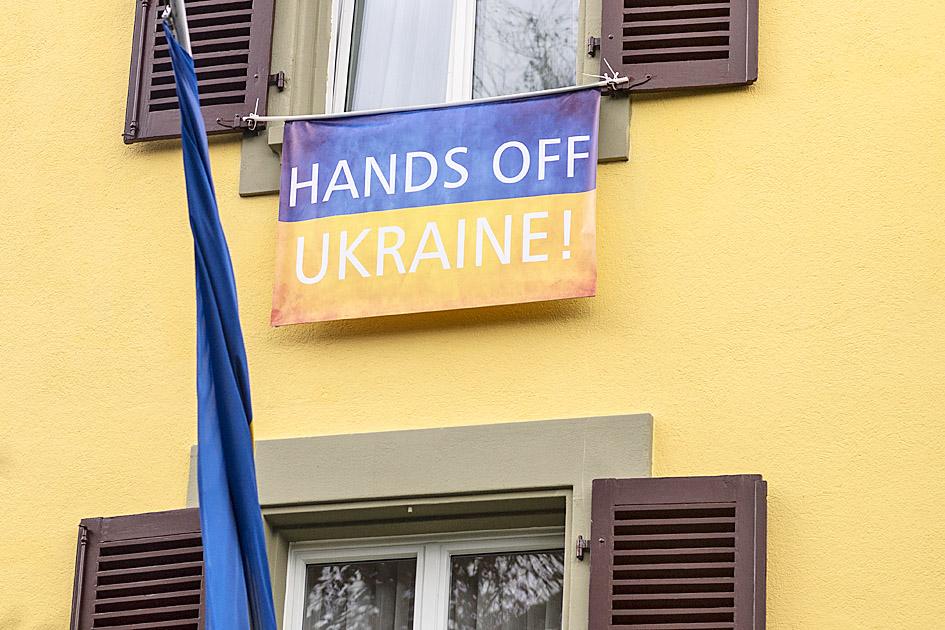With the smell of war in the air over Europe, world leaders got over the shock of Russian President Vladimir Putin’s order to deploy troops to separatist regions of eastern Ukraine and are focused on producing as forceful a reaction as possible.
Germany made the first big move, taking steps to halt the process of certifying the Nord Stream 2 gas pipeline from Russia.
The West insisted that Putin’s bold moves in Ukraine contravened countless international agreements and since words of diplomacy had failed, it was time to move toward action.

Photo: AP
“No lows too low, no lies too blatant, no red lines too red to cross,” Lithuanian Prime Minister Ingrida Simonyte said in summing up the political disgust felt from Europe to North America and democracies hugging Russia’s borders in Asia, such as Japan and South Korea.
Russia said that it is sending what it deems “peacekeepers” into eastern Ukraine, but EU High Representative for Foreign Affairs and Security Policy Josep Borrell said that they were “troops” on sovereign Ukrainian territory.
“I wouldn’t say that’s a fully fledged invasion, but Russian troops are on Ukrainian soil,” Borrell said.
The EU’s foreign ministers were to decide later yesterday on how deep a first batch of sanctions would have to cut.
It would likely stop far short of the “massive” package threatened by the EU and Washington for a full military invasion into national territory that Kyiv still controls.
“The way we respond will define us for the generations to come,” Simonyte said.
However, too much, too soon could also hurt the international response, Austrian Chancellor Karl Nehammer said.
A conflict could devastate Ukraine and cause huge economic damage across Europe, which is heavily dependent on Russian energy, but Asian nations are also worried.
South Korean President Moon Jae-in instructed his officials to prepare for the economic fallout if the Ukraine crisis worsens and US-backed nations levy stringent economic sanctions on Russia.
New Zealand Minister of Foreign Affairs Nanaia Mahuta said there was no basis under international law for Putin to recognize the Ukrainian separatist regions.
“We are concerned that this is a calculated act by President Putin to create a pretext for invasion, which would be a clear act of aggression. We again call for urgent diplomatic efforts to find a peaceful resolution,” Mahuta said in a statement.
Those on a saddle between Russia and the West were in an uncomfortable position.
NATO-member Turkey, which has close relations with Ukraine and Russia, criticized Moscow’s decision to recognize the independence of the regions in eastern Ukraine.
“We consider this decision by Russia as being unacceptable,” Turkish President Recep Tayyip Erdogan said. “We reiterate our calls to the parties to respect common sense and international law.”
Washington could be much more straightforward. The White House issued an executive order to restrict investment and trade in the separatist regions, and additional measures — likely sanctions — were to be announced later yesterday.
Those sanctions are independent of what Washington has prepared in the event of a Russian invasion, according to a senior administration official who briefed reporters on the condition of anonymity.

AIR SUPPORT: The Ministry of National Defense thanked the US for the delivery, adding that it was an indicator of the White House’s commitment to the Taiwan Relations Act Deputy Minister of National Defense Po Horng-huei (柏鴻輝) and Representative to the US Alexander Yui on Friday attended a delivery ceremony for the first of Taiwan’s long-awaited 66 F-16C/D Block 70 jets at a Lockheed Martin Corp factory in Greenville, South Carolina. “We are so proud to be the global home of the F-16 and to support Taiwan’s air defense capabilities,” US Representative William Timmons wrote on X, alongside a photograph of Taiwanese and US officials at the event. The F-16C/D Block 70 jets Taiwan ordered have the same capabilities as aircraft that had been upgraded to F-16Vs. The batch of Lockheed Martin

US President Donald Trump yesterday announced sweeping "reciprocal tariffs" on US trading partners, including a 32 percent tax on goods from Taiwan that is set to take effect on Wednesday. At a Rose Garden event, Trump declared a 10 percent baseline tax on imports from all countries, with the White House saying it would take effect on Saturday. Countries with larger trade surpluses with the US would face higher duties beginning on Wednesday, including Taiwan (32 percent), China (34 percent), Japan (24 percent), South Korea (25 percent), Vietnam (46 percent) and Thailand (36 percent). Canada and Mexico, the two largest US trading

GRIDLOCK: The National Fire Agency’s Special Search and Rescue team is on standby to travel to the countries to help out with the rescue effort A powerful earthquake rocked Myanmar and neighboring Thailand yesterday, killing at least three people in Bangkok and burying dozens when a high-rise building under construction collapsed. Footage shared on social media from Myanmar’s second-largest city showed widespread destruction, raising fears that many were trapped under the rubble or killed. The magnitude 7.7 earthquake, with an epicenter near Mandalay in Myanmar, struck at midday and was followed by a strong magnitude 6.4 aftershock. The extent of death, injury and destruction — especially in Myanmar, which is embroiled in a civil war and where information is tightly controlled at the best of times —

China's military today said it began joint army, navy and rocket force exercises around Taiwan to "serve as a stern warning and powerful deterrent against Taiwanese independence," calling President William Lai (賴清德) a "parasite." The exercises come after Lai called Beijing a "foreign hostile force" last month. More than 10 Chinese military ships approached close to Taiwan's 24 nautical mile (44.4km) contiguous zone this morning and Taiwan sent its own warships to respond, two senior Taiwanese officials said. Taiwan has not yet detected any live fire by the Chinese military so far, one of the officials said. The drills took place after US Secretary